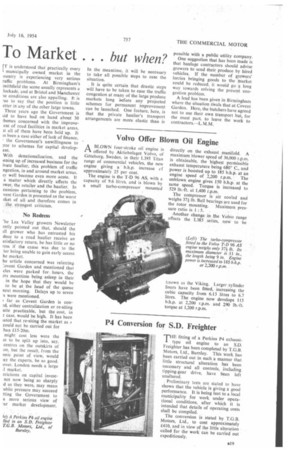Fo Market..
Page 53

If you've noticed an error in this article please click here to report it so we can fix it.
is understood that practically every municipally owned market in the untry is experiencing very serious iffic problems. At Birmingham's nithfield the scene usually represents ackade, and at Bristol and Manchester e conditions are also appalling. it is le to say that the position is little iter in any of the other large towns. Three years ago the Government is Id to have had on hand about 30 hemes concerned with the improveent of road facilities in market areas, it all of them have been held up. It is been a case either of lack of finance, the Government's unwillingness to :ice to schemes for capital developent.
With denationalization, and the cuing up of increased business for the ivate haulier, this problem of traffic ngestion, in and around market areas, ty well become even more acute. It a matter which directly affects the iwer, the retailer and the haulier. In cussions pertaining to the problem, vent Garden is presented as the worst rket of all, and therefore comes in the, strongest criticism.
No Redress The Lea Valley growers Newsletter :ntly pointed out that, should the ill grower who has entrusted his duce to a road haulier receive an atisfactory return, he has little or no ress if the cause was due to the ier being unable to gain early access he market.
he article concerned was referring :.'ovent Garden and mentioned that des were parked for hours, the ers meantime being asleep in their in the hope that they would he to be at the head of the queue next morning. Delays up to seven s were mentioned.
far as Covent Garden is con:d, either centralization or re-siting uite practicable, but the cost, in r case, would be high. It has been tated that re-siting the market as a could not be carried out for ban £15-20m.
might cost less were the et to be split up into, say, centres on the outskirts of on, but the result, from the imic point of view, would ay the experts, be so good. over, London needs a large .1 market.
frictions on capital investnot now being so sharply d as they were, may mean ublic pressure may succeed tting the Government to a more serious view of rar market development.
. but when?
In the meantime, it will he necessary to take all possible steps to ease the situation.
It is quite certain that drastic steps will have to be taken to ease the traffic congestion at many of the large produce markets long efore any projected schemes for permanent improvement can be launched. One feature, here, is that the private haulier's transport arrangements are more elastic than is possible with a public utility company.
One suggestion that has been made is that haulage contractors should advise growers to send their produce by hired vehicles. If the number of growers' lorries bringing goods to the market could be reduced, it would go a long way towards solving the present congestion problem.
A lead has been given in Birmingham where the situation rivals that at Covent Garden. Here, the butchers have agreed not to use their own transport but, for the most part, to leave the work to contractors.—L.M.M,




























































































